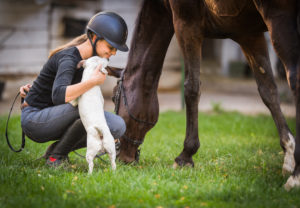Introduce your puppy to horses

When introducing your puppy to horses, be mindful of the following:
1. Puppies have fear periods. During these developmental stages (8-9 weeks, 6-9 months), it is wise to avoid traumatic experiences and capitalize on neutral or confidence-building ones.
2. Individual puppies react differently to new challenges. Some puppies will shrink back from novelty; others will rush in, as if oblivious to danger. Keep puppies on leash so you may manage their interactions safely. However, puppies that signal their desire to end the interaction by reaching the end of the leash should be allowed distance from the horse. The leash is there to keep puppies safe, not to compel them to interact with the horse.
3. Couple interaction with the horse with the delivery of food, praise, and petting to puppies that value those reinforcers. Test puppies away from the horse to make sure they like the food, and that they respond to praise and touch.
4. Neutral interactions help the puppy habituate to the horse, as do positive ones in which the puppy receives praise and food. Never push a puppy past threshold in an attempt to turn a neutral experience into a positive one.
5. Puppies may sniff the ground, avert their gaze, and otherwise appear not to see the horse. These behaviors may be calming signals in which the puppy communicates peaceful intentions to the horse. What looks to us like not paying attention may be meaningful to the puppy. Do not force the puppy to face the horse (or vice versa). Similarly, barking and whining should not be punished. Add distance between the puppy and horse until the puppy is quiet.
6. Characteristic movements of horses may trigger the puppy’s arousal, including snorting, shuddering, and stomping. Add distance if a puppy appears afraid, then move closer once he is calm. Gauge the puppy’s level of fear and arousal by whether or not he accepts food from the hand. If a puppy is too aroused, end the interaction for the moment and try again later.
7. Interactions with the horse are not obedience tests in which the puppy should sit, stay, etc. The youngster need only be in the presence of the horse. Obedience exercises will come after successful habituation is achieved. The puppy will respond to obedience cues once he is under threshold in the presence of horses. During the habituation phase, do not ask the puppy to respond to obedience cues.
